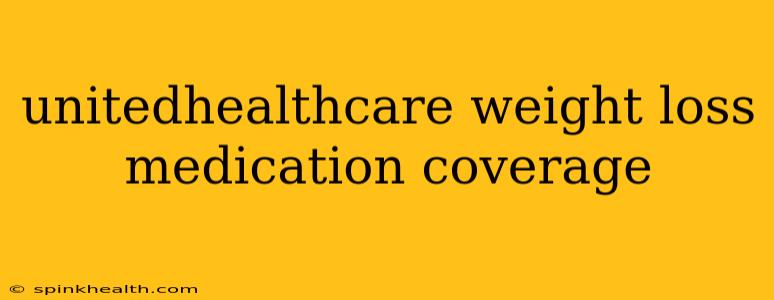The journey to a healthier weight can be challenging, and for many, medication can be a valuable tool in achieving their goals. But navigating the complexities of insurance coverage, especially when it comes to something like weight loss medication, can feel overwhelming. This guide will help you understand UnitedHealthcare's coverage for weight loss medication, answering common questions and providing valuable insights.
What weight loss medications does UnitedHealthcare cover?
This is a crucial question, and unfortunately, there's no single, simple answer. UnitedHealthcare's coverage for weight loss medications depends on several factors, including your specific plan, your doctor's recommendations, and the medication itself. Generally, UnitedHealthcare tends to cover medications approved by the FDA for weight management when prescribed by a qualified healthcare professional as part of a comprehensive weight loss program. This often includes medications like Wegovy (semaglutide), Ozempic (semaglutide), Mounjaro (tirzepatide), and Saxenda (liraglutide), but coverage can vary. It's essential to check your specific plan's formulary, which lists covered medications.
How do I find out what weight loss drugs my UnitedHealthcare plan covers?
Think of your plan's formulary as its medication shopping list. It's a detailed document specifying which drugs are covered and at what cost. You can access your plan's formulary in several ways:
- Online: Most UnitedHealthcare plans have an online member portal where you can find your formulary. Look for a section labeled "Formulary," "Drug List," or something similar.
- Mobile app: The UnitedHealthcare app often provides access to your plan details, including the formulary.
- Customer service: If you can't find the information online, call UnitedHealthcare's customer service number. They can help you locate your specific formulary and answer any questions you have.
Remember, formulary information can change, so it's good to check periodically.
What are the requirements for UnitedHealthcare to cover weight loss medication?
Beyond simply having the medication listed in your formulary, UnitedHealthcare typically requires adherence to several guidelines for coverage. These often include:
Meeting BMI requirements:
Many plans require a Body Mass Index (BMI) above a certain threshold, usually considered obese (BMI of 30 or higher), or overweight (BMI 27-29.9) with weight-related health conditions like high blood pressure or type 2 diabetes.
Prior authorization:
This is a common hurdle. Prior authorization means your doctor needs to submit a request to UnitedHealthcare justifying the need for the specific medication before they can prescribe it to you. This often involves providing detailed medical records and demonstrating that other weight loss methods have been attempted without success.
Participation in a weight loss program:
Your doctor might need to document your participation in a structured weight loss program, possibly including regular check-ups, dietary counseling, and exercise recommendations. This shows UnitedHealthcare you are committed to a holistic approach to weight management.
Does UnitedHealthcare cover weight loss surgery?
While this article focuses on medication, it's important to note that weight loss surgery (bariatric surgery) is a separate matter. UnitedHealthcare's coverage for bariatric surgery follows its own set of criteria, typically requiring a higher BMI, a thorough evaluation, and demonstrated commitment to lifestyle changes before and after the procedure. Contact UnitedHealthcare directly or consult your doctor to learn more about their specific requirements for bariatric surgery coverage.
What if my weight loss medication isn't covered?
If your preferred weight loss medication isn't covered, or if you face significant out-of-pocket costs, there are options to consider. These include:
- Exploring alternative medications: Your doctor might suggest another covered medication with similar efficacy.
- Appealing the decision: If you believe the denial of coverage is unjustified, you can appeal the decision through the appropriate channels within UnitedHealthcare.
- Exploring cost-saving options: Look into manufacturer coupons or patient assistance programs that might reduce your out-of-pocket costs.
Navigating health insurance can be tricky, but with careful research and communication with your doctor and UnitedHealthcare, you can find the best path to achieving your weight loss goals. Remember, the information above is for general understanding and individual plans may vary. Always check your specific plan details and consult with your healthcare provider.

